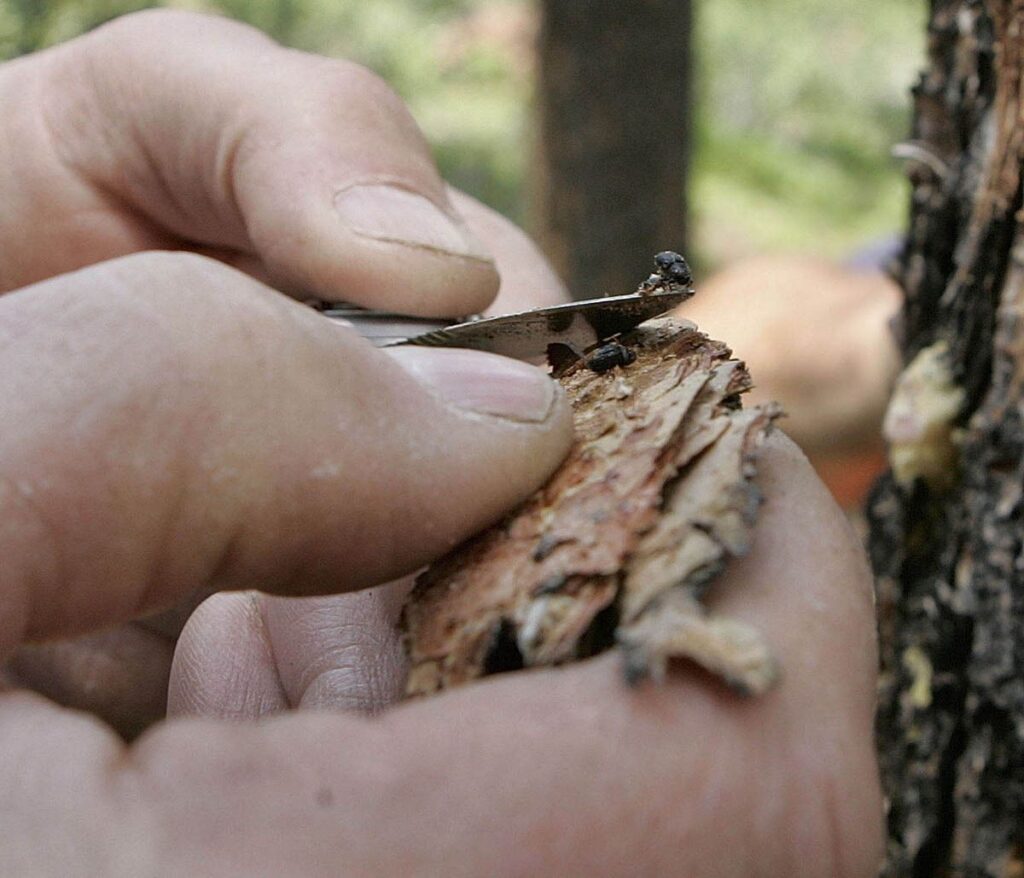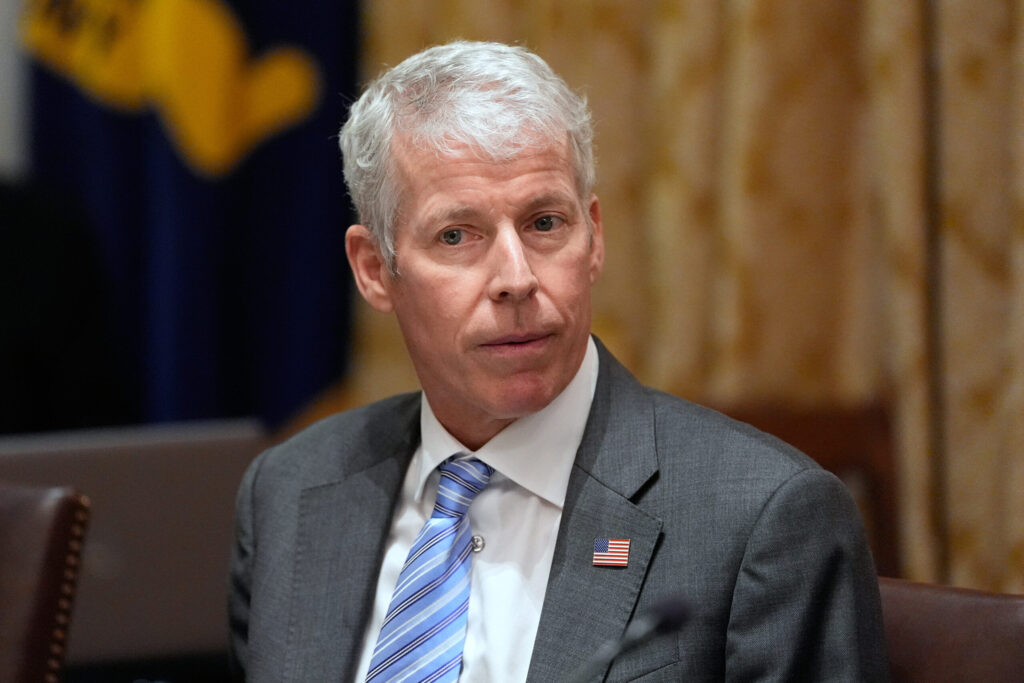Rally at Colorado Capitol calls for defense of Mallery family
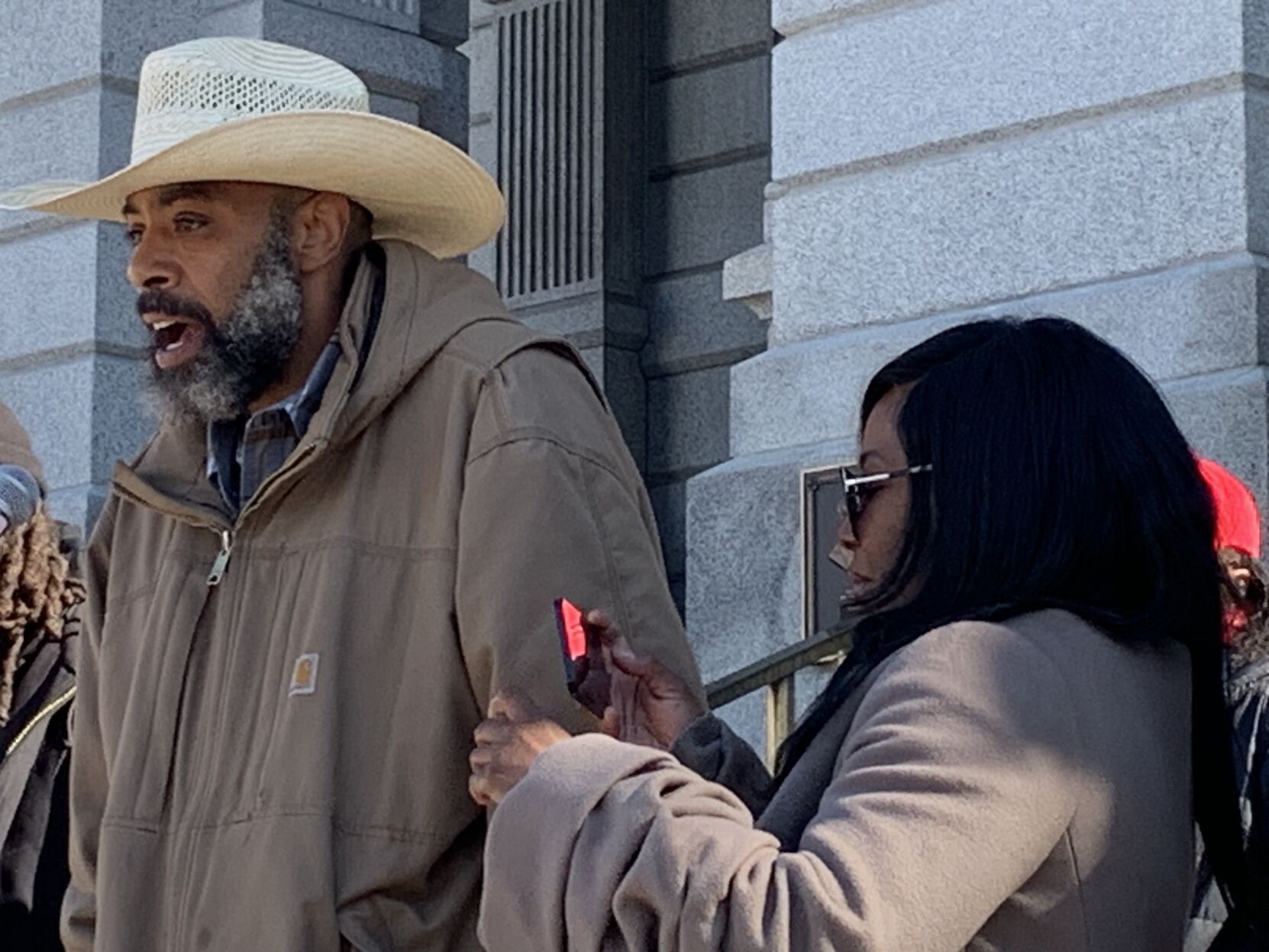
While House lawmakers inside the state Capitol debated a bill on the right to repair agricultural equipment, supporters of the Mallery family outside accused law enforcement in El Paso County of racially biased policing and of failing to defend the family against what they described as a racist neighbor.
Courtney Mallery, who is Black, farms in Yoder, about 30 miles east of Colorado Springs. He was arrested and charged last week with felony stalking, but he and his wife, Nicole Mallery, claim they’re the real victims of a terrorism campaign by a white neighbor, and that the El Paso County Sheriff’s office is complicit in the campaign and is violating their civil rights.
The Sheriff’s Office denies the claim, with Sheriff Joe Roybal saying “misinformation and a mischaracterization of my office and my employees had led to a level of uneasiness for many residents of Yoder, and some members of my staff and family members who have been specifically targeted.”
Mallery said Friday that 10 of his cattle have been killed, along with half of his pigs and some of his goats since the dispute began.
“I just want to farm in peace,” he said to a crowd gathered on the Capitol’s west side, adding that as a busy farmer he doesn’t have time for the things he’s been accused of.
The property-based argument between Courtney and Nicole Mallery and their neighbor, Teresa Clark, has been escalating since 2021 and drew national attention when Ark Republic, a New Jersey-based online publication, released a story on Jan. 16 detailing the Mallerys’ account. In the story, the couple alleged racist harassment from neighbors and discriminatory treatment from the Sheriff’s Office.
Residents with knowledge of the situation said the two families initially had a congenial, if not close, relationship, but their disagreement over rights to an easement caused a growing estrangement, leading to restraining orders and stalking arrests.
The dispute began not long after the Mallerys moved to Yoder in 2020 and set up a video security system along the fence that borders the easement between their 1,000-acre property, Freedom Acres Ranch, and Clark’s land. The easement is a spur of dirt road that, while it technically lies on the Mallery property, was set aside by the county for use by residents, including Clark, who need it to access their properties. A gate along the easement opens to the Mallery land, but it lies more than a half-mile from the main entrance to their ranch and even farther from the couple’s residence and outbuildings.
Neighbors who support Clark dispute the Mallerys claims of racism-based vandalism and intimidation, and in turn accuse the Mallerys of stoking – and capitalizing on – fear that has fractured and drawn unwanted attention to their tiny community.
“I feel like they’re the ones who are doing what they’re accusing everyone else of,” said a Yoder resident who didn’t want to be named.
Since the dispute between the Mallerys and Clark began, the Sheriff’s Office said it had responded to more than 170 calls for service involving the couple. Of those calls, 46 came from Clark, 47 from Nicole Mallery, and 11 from Courtney Mallery.
Arrest warrants accused the couple of routinely arriving on the easement, within minutes of Clark exiting her home, of spying on her using “active” surveillance cameras and taunting her from the property line, according to police. Nicole Mallery, who has no children attending school in the area, is accused of staking out and preventing neighbors’ access to a bus stop that previously was near the entrance of the easement. The bus stop was ultimately moved to a spot about a quarter-mile east.
At the rally Friday, the Mallerys also advocated for the General Assembly to pass the CAREN Act, which stands for Caution Against Racially Exploitative Non-Emergencies. The legislative proposal, which New York adopted and is under consideration in other states, would create a civil penalty for people who call the police on people of color in non-emergency situations and when there’s “no reason to believe a crime or offense, or imminent threat to person or property, is occurring.”
The legislative proposal was prompted by an incident in New York’s Central Park in 2020, when a white woman, Amy Cooper, made a false call to the police, claiming a Black man, Christopher Cooper, was threatening her life. Cooper caught the exchange on his cellphone, which showed Amy Cooper lied to the police about the interaction. Dubbed “Central Park Karen,” she was initially charged with false reporting, which was later dismissed when she agreed to counseling on racial bias. She lost her job with an investment house the day after the incident.
Vernon L. Howard, who chairs the Dr. Martin Luther King Jr. Colorado Holiday Commission, told Colorado Politics he does not know whether there is enough time in the 2023 session to tackle the CAREN Act but hopes that, if not, lawmakers will consider it next year.
The rally Friday drew more than 100 to the west steps, including state Rep. Regina English and Sen. Tony Exum, both Colorado Springs Democrats, and Rep. Naquetta Ricks, D-Aurora.
Exum said that when he got word of what was happening, he called the Sheriff’s Office to get both sides. Instead, he said, “we got a narrative that’s been developed that’s one-sided.”
“We’re going to change that. We’re going to make sure the Mallerys are treated fairly … they have a right to be there and to expect to be treated fairly by the sheriff’s department” and by other landowners,” Exum said, adding, “You have my commitment to keep an eye on this.”
The legislator also pledged to get the state attorney general involved.
Portia Prescott, president of Rocky Mountain NAACP, said there’s no way a white woman should be able to persecute and “weaponize” a police force against two people. El Paso County, Prescott said, has let the Mallerys down and did not protect the family against the “whiteness” happening in the county. She, too, advocated for passage of the CAREN Act.
In a press conference on Tuesday, Roybal said he is confident that his office’s responses have been “objective and based on facts and law, not on race” and that no one is more eager than him to rid his office of personnel who treat residents unfairly based on race.
The office also shared excerpts from several body-camera videos, as well as footage taken by a process server who approached the Mallery home on Apr. 7, 2021, and was allegedly chased off the property with a shotgun. The office has said it intends to release those videos to the public soon, “in their entirety … in the spirit of transparency and full disclosure.” Case reports are now available to be viewed on the department’s website, at epcsheriffsoffice.com
Howard said the situation underscored the importance of voting.
“If you want change, you have to vote it in. If you don’t like who’s in there, vote them out. They work for you,” Howard said.
Others said they are ready to fight and defend the Mallerys, even at the cost of their own lives.
“We need soldiers on that farm, 24/7,” said one speaker.
“I will die for you,” he told the Mallerys. “Political talk is over. They won’t do us right. I’m here to protect this family with my life.”
Courtney Mallery said he appreciates those who stand with him.
“I’m a farmer,” he said. “I just want to farm in peace.” He invited people to come and help, and to learn more about agriculture.
“My ranch is open to everybody,” he said.
The ranch started out as his dream, he said, adding, “It’s been eye-opening what’s happened to me. … What me and my wife have been going through, I wouldn’t wish on anyone,” he said.
Following the rally, the crowd marched, with a Denver Police escort, to the Martin Luther King Jr. statue in City Park.

marianne.goodland@coloradopolitics.com
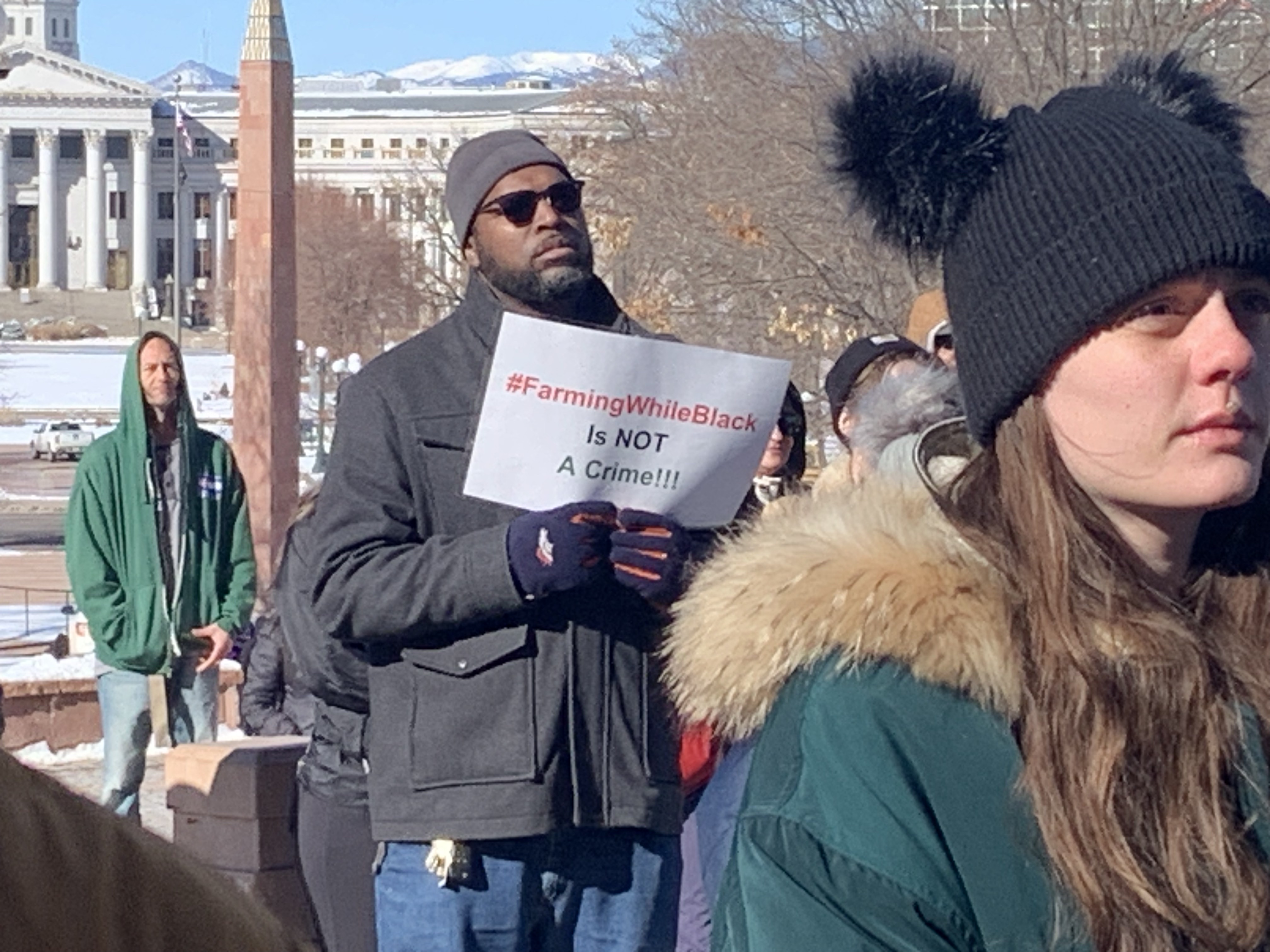
marianne.goodland@coloradopolitics.com

marianne.goodland@coloradopolitics.com
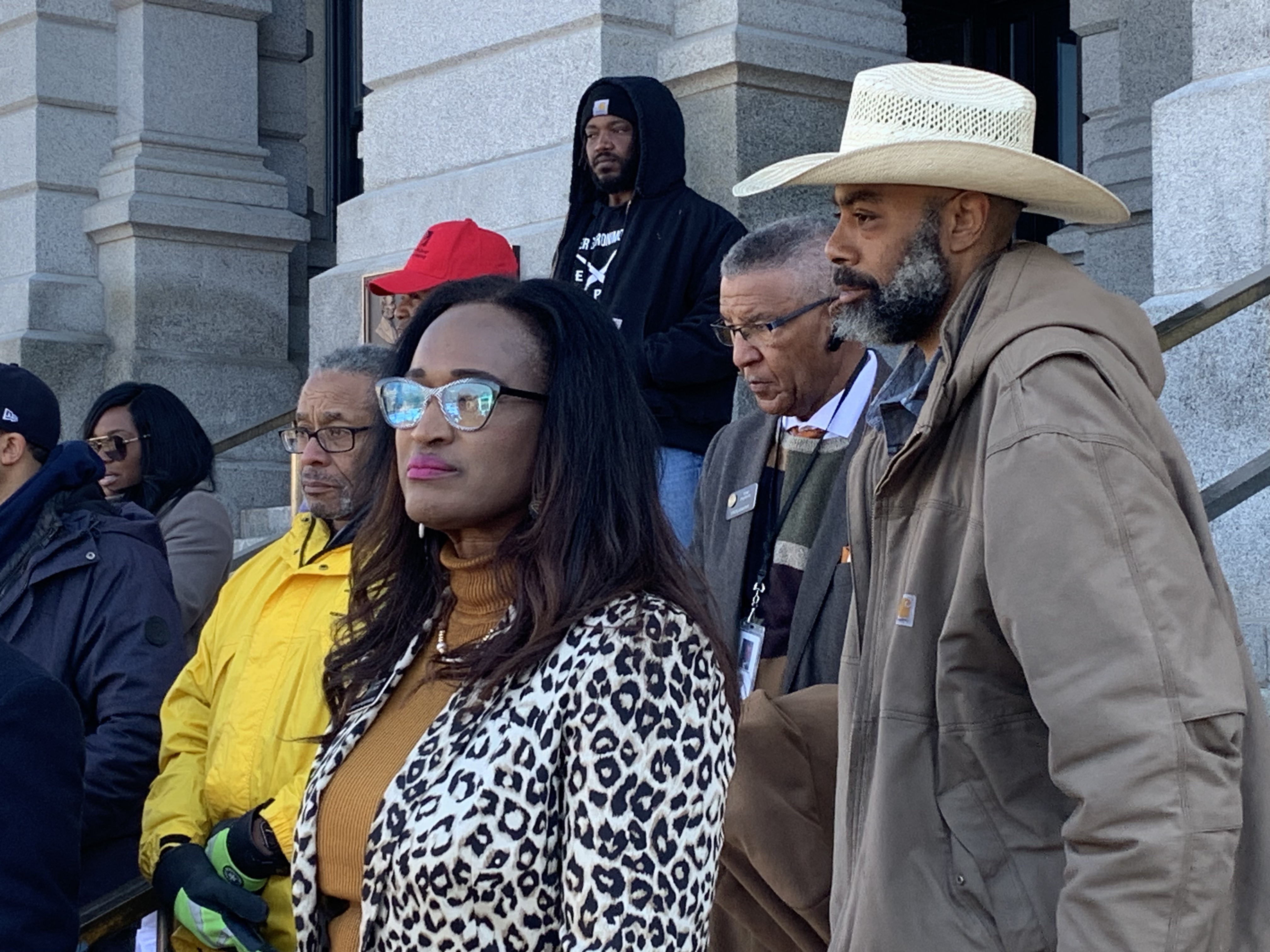
marianne.goodland@coloradopolitics.com
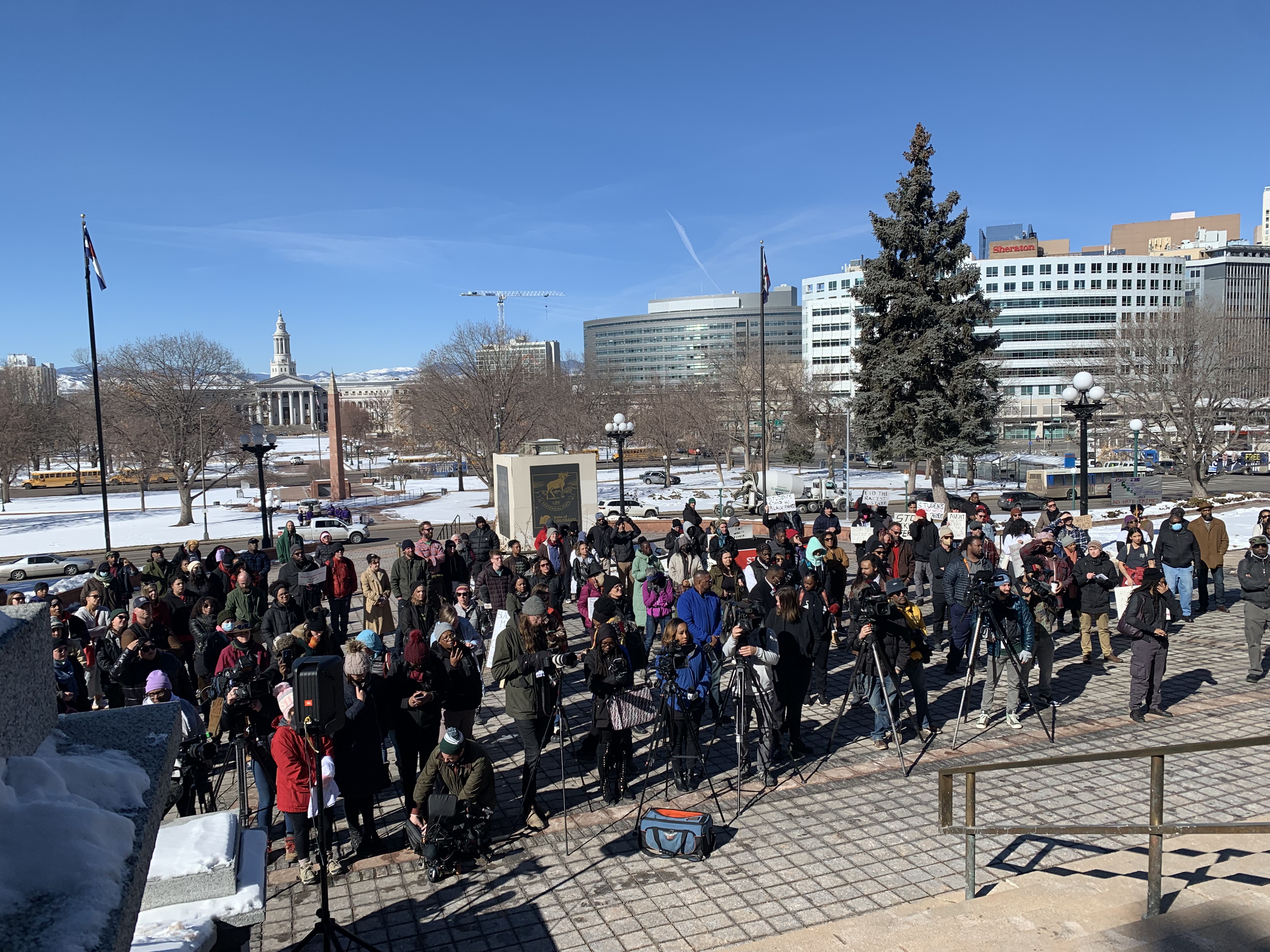
marianne.goodland@coloradopolitics.com


